Instructors
Instructors: don't see you bio/photo here, or need to modify it? Contact us at the link below.
 |
Edward Alexander (Gwich’in) is the Executive Director of Dinjii Zhuh K’yaa (Regional Gwich’in Language Center and Archive) in Fort Yukon, Alaska. The archive is a regional resource for preservation of Gwich’in language and cultural documentation. The archive engages in dissemination of their archival resources through social media like FaceBook, Wordpress and YouTube. Dissemination of language resources using augmented reality and locative technologies are indicative of the innovative projects underway at Dinjii Zhuh K’yaa. Workshop participants will benefit from Mr. Alexander’s perspective as a community archive director and his ability to discuss cultural, legal and political implications of language archive resource access. |
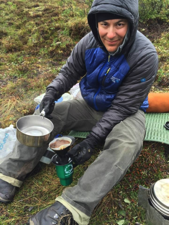 |
Sam Alexander is an aspiring Gwich’in speaker and a current faculty member at the University of Alaska Fairbanks in the School of Management. Sam was raised in Fort Yukon, Alaska, which is a large Gwich’in village on the Yukon River. His interests include second language acquisition, language revitalization, and cultural growth and maintenance. |
 |
Andrea Berez-Kroeker is an assistant professor in the Department of Linguistics at the University of Hawai'i, where she teaches classes in Language Documentation & Conservation. She has worked with the Ahtna community of Alaska and the Kere community of Papua New Guinea, and she's been teaching students to use ELAN since 2008. |
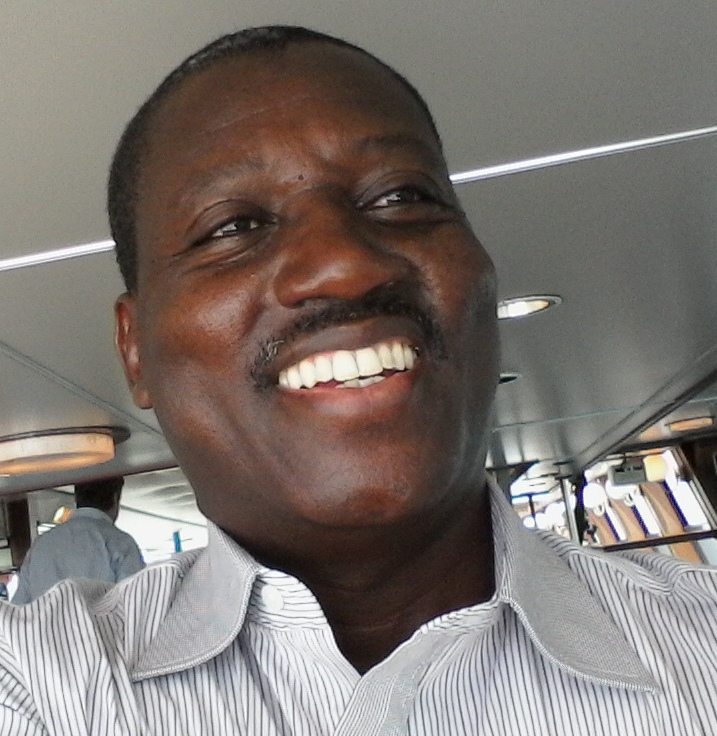 |
Kennedy Momanyi Bosire is a language activist, the director of Ekegusii Encyclopedia Project. He is the author of Ekegusii–English Dictionary. He is the main contributor and generator of the dictionary’s online version Ekegusii Dictionary and Encyclopedia. In working amongst his people; Abagusii of South Western Kenya over a period of fourteen years has seen a renewed interest in the revitalization of Ekegusii language. His county governor recently directed community schools to commence teaching the language to young children and to generate relevant teaching materials and curriculum. Mr. Bosire is closely involved in working with other interested community members to spearhead the promotion, use and preservation of Ekegusii language and culture through electronic media. He is a member of Abagusii Development and Cultural Council and Abagusii Welfare Association. He was recently nominated by his County Governor to be a member of a task force comprising community elders, the academia and professionals charting ways and means of ensuring that there is an effective reversal of the current trends of language shift. Kennedy is an active CoLanger (initially InField) since 2008 and subsequent institutes where he has participated as a student and as a language instructor (2008 Field Methods), Models (2008 and 2010) and as a Language Activism Instructor (2010 and 2014). He enjoys working with language interests. He regularly conducts institutional meetings and radio presentations championing the cause of Ekegusii; (revitalization, documentation and safeguarding against indigenous language loss). On behalf of the Abagusii Welfare Association, he is currently organizing for Abagusii Social Day whose objective is to showcase Abagusii culture. |
 |
Michael Cahill is Orthography Services Coordinator for SIL International. He received his Ph.D. from the Ohio State University with a dissertation on the morphology and phonology of Konni, a Gur language in northern Ghana. He also helped develop the Konni orthography in the course of his several years of living among the local people, as part of a broader language development and translation project. He has been a member of the LSA Committee on Endangered Languages and their Preservation for 10 years, chairing it in 2003. He specializes in phonology (especially tone and labial-velars!) and has taught courses in phonology, field methods, and tone analysis, and co-taught the Orthography course at the 2014 CoLang. |
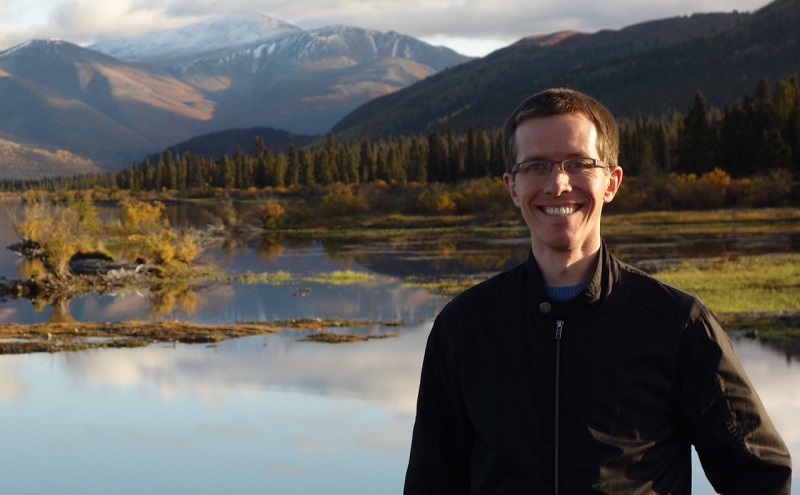 |
Christopher Cox is a linguist with First Nations Programs and Partnerships, Yukon Education, providing support for Indigenous language education and revitalization in the Yukon, Canada. His recent research centers on the collaborative development and application of of corpora—permanent collections of language resources—in language documentation, revitalization, and description. In addition to his work with Yukon First Nations languages, he has been involved in language documentation and revitalization efforts with speakers of Tsuut'ina, a Dene language of southern Alberta, and of Plautdietsch, the traditional language of the Dutch-Russian Mennonites. |
 |
Ewa Czaykowska-Higgins' primary research involves the Salish languages of western North America. She has written on the phonology, morphology and syntax of Salish languages, focusing on Nxaʔamxčín and North Straits, and is currently engaged in a long-term project with the Nxa'amxčín Language Program of Colville Tribes to create a print dictionary and a web-accessible dictionary and database. She was one of the initiators of a SSHRC partnership grant (2004-2010) whose focus was language revitalization of SENĆOŦEN and Hul'q'umi'num' Salish; amongst other roles she served for several years as Principal Investigator and Director. Her community-engaged work has included projects on ethical issues in linguistic fieldwork, on Community-Based Language Research methodology in linguistics, on policies and practices in evaluating community-engaged scholarship, and on language revitalization. Since 2003 she has been an ally in the development and delivery of the Certificate in Aboriginal Language Revitalization and the Indigenous Language Revitalization Bachelor's and Master's programs at the University of Victoria, where she teaches. In 2014, she co-taught two workshops at CoLang and she is currently a co-convener of the CoLang Advisory Circle. |
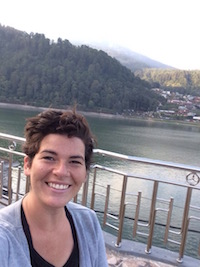 |
Hali Dardar holds a B.A. in Mass Communication and M.A. Art, Culture, and Media with a focus on cultural participation. She is the director of the Houma Language Project- a native organization for the participation of Houma culture through language. After attending Colang 2014, Hali began to search for methods to teach community members linguistic fields methods. In 2015, she wrote Ola! A Guide to Oral Language Acquisition. The book is a language-ambiguous manual for community members seeking to participate in culture through language learning. |
 |
Jenny Davis is an assistant professor in American Indian Studies and Anthropology at the University of Illinois, Urbana-Champaign and a citizen of the Chickasaw Nation. She earned her PhD in Linguistics at University of Colorado, Boulder in 2013. She attended the first CoLang (then InField) at the UC, Santa Barbara as a graduate student and served on the CoLang advisory circle from 2013-2015. Jenny returned to the CoLang institute at the UT, Arlington in 2014 to teach Language Activism. In her work, Jenny analyzes the intersections of indigenous community, identity, and
language. She is particularly interested in language revitalization and documentation
in indigenous communities and how processes of globalization affect these movements
of linguistic reclamation. Within the arena of language reclamation, she combines
over 8 years of documentation and ethnographic fieldwork of Chickasaw language revitalization
efforts in South-central Oklahoma, with more recent research with language revitalization
in the urban centers of San Francisco, CA; Tulsa, OK; and Chicago; IL. Her current
research project is a multisite ethnographic investigation of the ways that--in the
modern, urban American Indian diaspora--indigenous language(s) are used and revitalized
in locations other than Native American reservations and trust lands. |
 |
Arienne Dwyer was Co-Director of the 2012 CoLang Institute, and has worked for the last 20 years
with and for language communities in Inner and Central Asia, as well as the United
States, creating audio-visual and lexical resources for the language maintenance.
She is a Professor of Linguistic Anthropology and Co-Director of the Institute for
Digital Research in the Humanities at the University of Kansas. |
 |
Barbara Fox is Professor of Linguistics at the University of Colorado Boulder. She works in the area of Interactional Linguistics, with a focus on morpho-syntax. She has worked on a wide range of languages, and is currently involved in a typological study of self-repair in eleven areally and typologically diverse languages, as well as projects on conversational English. |
 |
Margaret Florey is a co-founder of the Resource Network for Linguistic Diversity (RNLD) and is the creator and Director of the Documenting and Revitalising Indigenous Languages Training Program at RNLD. Margaret was awarded a PhD in Linguistics from the University of Hawai'i at Manoa in 1990. She taught linguistics in academic roles for eighteen years, including a Senior Lecturership at Monash University from 2000-2008. Margaret is an experienced field linguist with documentary expertise in the endangered Austronesian languages of Central Maluku, eastern Indonesia, and Australian languages of Western Australia. Her research was supported by grants from the Australian Research Council, the Endangered Languages Documentation Program, the Wenner-Gren Foundation and the Volkswagen DOBES Program. Since 2009, Margaret has developed and managed the Documenting and Revitalising Indigenous Languages training program and delivers grassroots training across Australia to Aboriginal people in family groups, communities and Indigenous organisations. Margaret was a founding member of the InField/CoLang Advisory Circle, and has taught workshops at InField 2008 (UC Santa Barbara) and 2010 (U Oregon) and 2014 CoLang (U Texas at Arlington). She has also twice taught at CILLDI (Canadian Indigenous Languages and Literacy Institute, Edmonton) in 2009 and 2010, and at the First Nations Languages Program at UBC (2009). |
 |
Lauren Gawne is an ELDP Postdoctoral Research Fellow at SOAS, University of London. Lauren works with Tibetic languages of Nepal, with current work focusing on Kagate history, narrative and song. Lauren has facilitated Wikipedia editathons in Singapore, London and online as part of the #lingwiki community on Twitter and Tumblr. She practices what she preaches by updating relevant language pages (e.g. en.wikipedia.org/wiki/Yolmo), and uses the wiki format to share her research (e.g. en.wikibooks.org/wiki/Research_on_Hyolmo). Her research interests include evidentiality, language documentation methods and gesture, and she runs Superlinguo. |
 |
Susan Gehr, an enrolled tribal descendant of the Karuk Tribe, has a master's in linguistics from the University of Oregon and a master's in library and information science from San José State University. Gehr served as a linguist mentor at the Breath of Life Workshop held by the Advocates for Indigenous California Language Survival at UC Berkeley in 2004 and 2012. Gehr conducted an oral history for her MLIS thesis entitled “Breath of Life: Revitalizing California’s Native Languages Through Archives.” Gehr will be working with other Karuk community language scholars who are involved in documenting and revitalizing their language to care for their materials with support from the National Science Foundation’s Documenting Endangered Languages Program. Gehr has co-taught several courses at CoLang and she is currently a co-convener of the CoLang Advisory Circle. |
 |
Spike Gildea is Professor of Linguistics at the University of Oregon. He was a Peace Corps Volunteer
teaching English in Nepal (1983-85), then in 1988 began descriptive linguistics work
in South America, where, supported by multiple NSF grants, he has collected primary
data from speakers of 15 Cariban languages spoken in Venezuela, Brazil, and Guyana.
His primary publications are in historical syntax, comparative Cariban studies, and
typology. He has taught at all four InField/CoLang summer institutes, serving also
as Director of InField 2010 (which was held at the University of Oregon). He is currently
working with two colleagues on a DEL-financed project to document the Yawarana language
of Venezuela; he is also collaborating with the Katxuyana schoolteachers and the NGO
Iepé (Institute de Pesquisa e Formação Indigena) in Brazil to develop literacy and
language education materials in and for the Katxuyana language. |
.jpg) |
Alice C. Harris is Professor of Linguistics; her work focuses on historical linguistics, morphology, and languages of the Caucasus. Harris has a strong interest in the documentation of endangered languages and chaired the committee whose work culminated in establishing the joint NSF-NEH-Smithsonian program, Documentating Endangered Languages (DEL). Having received the Ph.D. degree from Harvard University in 1976, Harris became research assistant professor at Vanderbilt University in 1978. In 1991 she became Professor of Linguistics and Anthropology, and she served as chair of the Department of Germanic and Slavic Languages from 1992-2002. She moved in 2002 to join the Department of Linguistics at Stony Brook University, where she served for four years as director of graduate studies, then moved to the University of Massachusetts Amherst in 2009. Together with co-author Lyle Campbell, Harris was awarded the Linguistic Society of America’s Leonard Bloomfield Book Award in 1998, and in the same year she won the Earl Sutherland Prize for Achievement in Research by Vanderbilt University. She has been a Visiting Erskine Fellow at the University of Canterbury (Christchurch, New Zealand, 1999) and Fellow of the Center for Advanced Study of the Norwegian Academy of Science and Letters (2005). In recent years she has been a Guggenheim Fellow (2009-2010), has held the Collitz Professorship at the Linguistic Society of America’s Linguistics Institute (2011), and has been elected a Fellow of the Linguistic Society of America (2012). She is author of Georgian Syntax (Cambridge, 1981), Diachronic Syntax: The Kartvelian Case (Academic Press, 1985), Endoclitics and the Origins of Udi Morphosyntax (Oxford, 2002), and Multiple Exponence (Oxford, forthcoming), and co-author of Historical Syntax in Cross-Linguistic Perspective (Cambridge, 1995). She is editor of The Indigenous Languages of the Caucasus: Kartvelian (Caravan, 1991), and co-editor, with Florian Jaeger and Elisabeth Norcliffe, of Laboratory in the Field: Advances in Cross-Linguistic Psycholinguistics, a special issue of Language, Cognition and Neuroscience (2015). In 2016 Harris serves as President of the Linguistic Society of America. Her current
projects are a grammar of Batsbi and collaborative cross-linguistic work on processing of affixes
and clitics. |
 |
Allan Hayton is Gwich’in Athabascan from Arctic Village, Alaska. He is the Language Revitalization Program Director at Doyon Foundation. He is the son of Lena Pauline Hayton from Fort Yukon, and James T. Hayton from Natick, Mass. His grandparents are Robert and Lena Albert from Tanana and Fort Yukon. Allan studied Theatre & Film at Haskell Indian Nations University and the University of Kansas, finishing his Bachelor of Arts degree in 1992. He continued at the University of Alaska Fairbanks, |
 |
Kristine Hildebrandt is an Associate Professor of linguistics in the department of English Language & Literature at Southern Illinois University Edwardsville. She is also the co-founder of the Interdisciplinary Research and Informatics Scholarship (IRIS) center at SIUE, a facility devoted to digital humanities scholarship and education. Kristine’s research focus is the documentation and description of endangered minority languages, particularly those spoken in the Himalayas. Kristine has been undertaking documentation, archival, analytical, and revitalization work in Nepal for the past sixteen years, including a new endeavor (beginning summer 2015) to annotate and archive interviews and narratives collected from survivors of the April 2015 Nepal earthquakes. |
 |
Tracy Hirata-Edds is a language acquisition specialist. She has worked with Cherokee Nation in language education and with various other documentation and revitalization programs through research, workshops and presentations (e.g., ONLA, Breath of Life, Ford Foundation, CoLang, NIH, NSF). From working closely with many participants, including language documenters, speakers, linguists, and teachers, she has built an understanding of how the interaction between what is documented and what is needed for language teaching and learning can be better supported through documentation of language in context. She was an instructor for CoLang 2012 at the University of Kansas and for CoLang 2014 at the University of Texas-Arlington. |
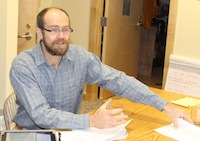 |
Gary Holton is Professor of Linguistics the University of Hawai‘i at Mānoa. His research focuses on inter-disciplinary approaches to the documentation of Athabascan and Papuan languages. |
|
Penelope Howe is a PhD Candidate at Rice University and will defend her dissertation in 2016. Her research examines variation in the use of pitch and modal voicing/voice onset time cues to manifest the voiced/voiceless contrast in various dialects of Malagasy, taking a sociolinguistic perspective of both production and perception. During a cumulative eleven months in Madagascar, she has collected an enormous amount of acoustic phonetic and perceptual data and has therefore spent hundreds of hours glued to Praat measuring, analyzing and visualizing this data. She is eager to share the knowledge and skills gained through this process with CoLang attendees, so that they may also come to appreciate the joys and benefits of working with Praat while minimizing the inevitable frustrations of the learning curve. She is also excited to share her experiences in Madagascar and to hear about other researchers’ field experiences. Penelope has served as a teaching assistant for “Phonetics” and other courses, has taught an informal “Introduction to Praat” to students and professors in Madagascar, and in Spring 2016 will be the lead instructor for “Language and Society” at Rice. Her (not-so-secret) favorite pastime while taking a break from work in Madagascar is singing Malagasy karaoke. |
|
 |
Uwemedimo Enobong Iwoketo is a professor of oral and written literature currently teaching in the Department of English, University of Jos, Nigeria. She has worked extensively on the Oral Literature of Ibibio people of Akwa Ibom State with specific interest in Childlore, Ibibio proverbs, traditional drama, folktales and oral poetry. She has been involved in the teaching of oral literature at the undergraduate and graduate levels: ENG 216, ENG 323 and ENL 532. At the graduate level, Uwemedimo has proposed a course which will focus on Childlore. When approved by her Graduate School, Childlore will explore childhood tradition; this encompasses all the aspects of literary genres engaged in by and for children. |
 |
Barbara Kelly teaches in Linguistics and Applied Linguistics at The University of Melbourne. Her PhD, from the University of California, Santa Barbara, focused on language development through gesture. During this time she carried out fieldwork resulting in a grammar of Sherpa and a love of Tibetan salt tea. She is interested in the interaction between language, culture, and cognition in children’s early language development. Her research and publications focus primarily on how language- internal grammatical pressures interact with social pressures in children's socialization toward becoming competent language users. She is intrigued by language development across vastly different languages and cultures and her current research investigates the acquisition of Murrinhpatha, an Indigenous Australian language. Barb sees a role for the documentation of child language in conservation and revitalization and led a Special Session on ‘Pedagogy in Language Conservation’ at ICLDC, 2015. She co-edited a Special Issue of First Language on ‘Indigenous children’s language: Acquisition, preservation and evolution of language in minority contexts’ and has compiled a Child Language Suite of resources for eliciting, recording, and documenting children’s language use and language learning. |
 |
Jorge Emilio Rosés Labrada is a Banting Postdoctoral Fellow at the University of British Columbia's First Nations and Endangered Languages Program where he is working on a project to document and describe the phonetic properties glottalized resonants in 14 languages, seven from BC and seven from the Amazon. His doctoral work was carried out at The University of Western Ontario and the Université Lumière-Lyon 2 and focused on the Mako language of the Venezuelan Amazon. He was a participant in InField 2010 and co-taught Life in Communities with Lise Dobrin and Spike Gildea at CoLang 2014. |
 |
Seunghun J. Lee is Associate Professor of Linguistics at International Christian University in Tokyo Japan since September 2015. He is also a Senior Research Associate at University of Johannesburg in South Africa. His research focuses on interface of phonetics and phonology as well as phonology and syntax. His data comes Xitsonga (Bantu, South Africa), Du’an Zhuang (Tai-Kadai, China), Burmese (Myanmar) and Nuosu Yi (Tibeto-Burman, China); all collected from the field. He participated in the 2010 InField summer school held at University of Oregon. He has been integrating language documentation techniques in answering his research questions. Dr. Lee received his Ph.D. in linguistics from Rutgers, the State University of New Jersey. Prior to his current position in Tokyo, he was Associate Professor of Linguistics and TESOL at Central Connecticut State University. |
|
Ben Levine, was originally trained as a Clinical Psychologist where he developed the use of video feedback as a therapeutic resource based on work with severely disabled adolescents and Vietnam veterans. Integrating diverse techniques from public health outreach, civil rights organizing, social media, and cinema verité filmmaking, he and his colleagues at Speaking Place (www.speakingplace.org) have created new methodologies for documenting endangered languages. Innovations such as Natural Group Conversation documentation and the Endangered Language Portal (www.PMPortal.org) now offer linguists and community language advocates tools for richer, culturally contextualized documentation as well as new opportunities for research and language revival. His three feature documentaries on endangered languages have been featured at numerous festivals and community and university presentations. He was the first person not of French Canadian descent to be inducted into the Franco American Hall of Fame for filmmaking that led to language revival in New England. He is currently directing and conducting training for three language documentation projects in the US, Canada, and Mexico. |
|
 |
Megan Lukaniec |
 |
Michal Temkin Martinez is Associate Professor and Director of the Linguistics Lab at Boise State University. Her dissertation and consequent research, on Modern Hebrew, includes the integration of perception and production experimental data collection with current phonological theory. Her current work also includes an approach integrating experimental and traditional descriptive methods to the documentation of languages spoken in Boise, Idaho by those who arrived as refugees. She is currently collaborating with Jon P. Dayley, and members of the Somali-Bantu refugee community in Boise documenting Chizigula (Mushungulu; xma; Bantu, Somalia). She participated in the 2010 InField, and received her Ph.D. in linguistics from the University of Southern California. |
 |
Gretchen McCulloch writes about linguistics for the general public. She has facilitated Wikipedia editathons
at many linguistics conferences to teach linguists how to edit Wikipedia and improve
linguistics-related articles, with the support of an Inspire grant from the Wikimedia
Foundation. Her how-to-edit slides are available at bit.ly/lingwiki and information about previous editathons is at allthingslinguistic.com/tagged/lingwiki. She's also worked with wikis for several field methods classes, including CoLang
2012 and the publically available migmaq.org wiki, where she's an admin. |
 |
Bradley McDonnell is a PhD candidate in the Department of Linguistics at the University of California, Santa Barbara. He has conducted fieldwork on Besemah, a Malayic language of southwest Sumatra, Indonesia since 2008. While he has conducted research on phonetic and phonological aspects of the language, his dissertation research centers on the interaction of discourse and grammar in Besemah’s voice system. Bradley also taught ELAN I & II workshops at CoLang 2012 at the University of Kansas. |
|
Daryn McKenny is founder of the Miromaa Aboriginal Language and Technology Centre since 2003. He is a passionate Aboriginal person and proudly acknowledges his traditional heritage to the Gamilaraay and Wiradjuri nations. Born and raised on Awabakal country on the east coast of NSW, Australia, Daryn has spent over 14 years in steering the revival of the Awabakal language of that area. Daryn is the creator of the software program Miromaa that today has been obtained to assist language programs around the world in well over 200 languages. He has found that technology is the one tool that Indigenous people can use to help stop the loss and is also the one tool, which can be used to reclaim and once again assist to be in control of our language, cultural and knowledge conservation efforts. He has been instrumental in developing ways of using technology to assist in empowering Indigenous people not only in Australia but worldwide to be hands on at all levels of language activity through the creation of his program, Miromaa. His language centre also organises and hosts the National Puliima Indigenous Language and Technology Forum every two years in Australia and established the “Our Languages” website. Daryn is always looking for innovative methods to help others find ways to stop language loss and in turn capture and disseminate our original languages. Daryn currently is a director of First Languages Australia (FLA) and advisory Circle member for the Institute on Collaborative Language Research (CoLang). Further Information: Miromaa: http://www.miromaa.org.au/ |
|
 |
Mizuki Miyashita is an Associate Professor, Linguistics Program, Dept. of Anthropology, at the University of Montana. She works with the Piegan Institute, a non-profit research organization on the Blackfeet reservation on documentation and revitalization. Together they have been documenting the Blackfoot language, including words in isolation, stories, conversations, and songs (lullabies) for the past eight years. She has also helped Blackfoot language instructors develop teaching materials, and has been training young members of Blackfoot-speaking communities in linguistics. She was a participant in CoLang 2014 at the University of Texas-Arlington. |
|
Juliet Morgan is a PhD candidate in linguistic anthropology at the University of Oklahoma. Her dissertation research focuses on adult language learners of Chickasaw, specifically examining how the adult learners are acquiring certain Chickasaw verbal morphology through a Master-Apprentice program. She uses FLEx in her research with Chickasaw, but she has also created a FLEx database for research with Plains Apache. Juliet co-taught the FLEx I & II workshops at CoLang 2014 at the University of Texas at Arlington |
|
 |
Sarah Ruth Moeller is adjunct faculty at the Graduate Institute of Applied Linguistics. She has conducted field research in the Caucasus Mountains, focusing on data management and archiving best practices. She used SayMore to build documentary corpora from hundreds of scattered recordings. These corpora are now accessible to the Tsakhur and Rutul communities.
|
|
Hiroyuki Nakama was born in Nishihara village on the island of Miyako, Okinawa. After finishing local high school, he moved to Mainland Okinawa to study at the University of the Ryukyus. This was when Okinawa was still under the occupation of the U. S. After obtaining a bachelor degree in mathematics, he taught a number of years at several high schools in Okinawa, ending his teaching career by serving as principal at his alma mater Miyako High School. During his teaching career, Principal Nakama briefly studied in the U.S., and since 2008, he has been associated with Okayama University of Science. Principal Nakama is an active advocate of teaching the endangered Miyako language in general and the Nishihara version of the Ikema dialect in particular. He has conducted his own workshop series for several years and served as a lead consultant and teacher for a number of documentation and maintenance projects, classes and workshops including those at Kyoto University, Tokyo University of Foreign Studies, and UCLA. On top of his busy schedule working for Okayama University of Science and his involvement in Miyako language work, Principal Nakama still finds time to decipher old Miyako songs and classical Japanese texts, write essays, do karaoke, and learn to play sanshin, a traditional guitar-like instrument from Okinawa. |
|
 |
Toshihide Nakayama is a Professor at ILCAA, Tokyo University of Foreign Studies, Tokyo, Japan. He has
been working primarily on description and documentation of Nuuchahnulth (a Wakashan
language spoken in British Columbia, Canada) and Miyako (a Ryukyuan language spoken
in Okinawa, Japan). He has been the head of the Linguistic Dynamics Science Research
(LingDy) Project, a strategic research project at ILCAA that focuses on research on
linguistic diversity and documentation of endangered languages. He has been organizing
Documentary Linguistics Workshop, an annual week-long intensive workshop on language
documentation held in Tokyo. |
 |
Katherine Nelson, Ph.D. is an instructional assistant professor at Illinois State University. Over the past two years, she has taught courses ranging from introductory through graduate level on topics including introductory linguistics, grammar, sociolinguistics, and TESOL. She received an Excellent Teacher of the Year Award from the English Department at Illinois State University for 2015-2016. Katherine completed her dissertation in May 2013 at Rice University. Her dissertation is a phonetic description of Nez Perce, an understudied and highly endangered American Indigenous language spoken in the Pacific Northwest of the United States. Katherine spent portions of four summers in Idaho gathering data for her dissertation and for future research stemming from that work. Her dissertation compares and contrasts the phonetic inventory of Nez Perce and other languages around the world. This work includes a phonetic analysis of ejectives, plain stops, fricatives, glottalized sonorants, plain sonorants, monophthongs, diphthongs, and a vowel harmony system, which were studied using duration, pitch, formant, amplitude, bandwidth, and intensity measurements in Praat. Katherine is also a full lyric soprano soloist and has performed with the ISU Civic Chorale and with the Eugene International Concert Choir and the Rijeka Chamber Orchestra in Venice, Florence, and Rome, Italy. |
 |
Carolyn O'Meara's research interests can best be characterized as being part of the field of anthropological linguistics, in particular, linguistic (and non-linguistic) categorization of landscape. I am also interested in semantics, especially lexical semantics, spatial and temporal reference. More generally, my work focuses on documenting and describing an indigenous language of Mexico, namely, Seri, which is spoken in the northwestern part of the state of Sonora. |
 |
Yoshi Ono (Professor in East Asian Studies at the University of Alberta) is a specialist in
Japanese conversation and grammar. Since 2006, he has been doing fieldwork on the
Ikema dialect of the Miyako language spoken on three Japanese islands near Taiwan.
He also directs the Spoken Discourse Research Studio at Alberta. |
 |
Ivan Ozbolt completed his PhD in Linguistic Anthropology at the University of Oklahoma (2014). His dissertation is entitled, “Community Perspectives, Language Ideologies, and Learner Motivation in Chickasaw Language Programs”. His research interests include language ideologies, language socialization, and second language acquisition in the context of language revitalization efforts. He has been working at the Citizen Potawatomi Nation Language Department since 2015.
|
| |
Susan Paskvan, known as “K’etsoo” in Denaakk’e (Koyukon Athabascan) is the daughter of Benedict and Eliza Jones of Koyukuk, Alaska. She is the Native Language Coordinator of Yukon-Koyukuk School District, which serves nine Interior Alaska Schools. In this role, Susan teaches Denaakk’e (Koyukon) and Benhti Kenaga’ (Lower Tanana) languages over two-way video-conference; develops the curriculum, lessons and materials; and coordinates professional development workshops for language speakers and educators. She believes there is no greater joy than watching a child having fun learning their language. |
 |
Hishinlai’ Peter has learned her ancestral language, Gwich’in, as an adult. She is very passionate about learning and teaching the Gwich’in language at the University of Alaska Fairbanks. Her BA is in linguistics, and her M.Ed. is in education, with an emphasis on Curriculum and Instruction. She is currently ABD (Interdisciplinary) in Linguistics and Anthropology. Her research is in second language acquisition and effects on identity. In addition, she is working on publishing all of the language lessons, along with activities, that occur in her beginning Gwich’in classroom. |
|
Willem J. de Reuse, Ph.D., Linguistics, 1988, University of Texas at Austin. Research Professor at the Linguistics Program, College of Information, University of North Texas, specializing in the description and documentation of Native American languages, with an emphasis on Quechuan (Santiago del Estero, Ayacucho), Siouan (Ofo, Lakota), Eskimo-Aleut (Siberian Yupik Eskimo), Lule-Vilela (Argentina) and Athabaskan (Apachean, Hän). Review Editor of the International Journal of American Linguistics. He has written Siberian Yupik Eskimo. The Language and Its Contacts with Chukchi (1994), A Practical Grammar of the San Carlos Apache Language (2006), and, with Shobhana Chelliah, Handbook of Descriptive Linguistic Fieldwork (2011). |
|
 |
Faun Rice is an MA student in the Department of Anthropology at the University of Alberta under the supervision of Dr. Andie Palmer. Her thesis research is focused on the relationship between Indigenous self-governance , policy, and political capital in Canada and the revitalization and preservation of North Slavey in Déline, Northwest Territories. She conducted fieldwork in the summer of 2016. Since 2012, she has been the program coordinator for the Canadian Indigenous Languages and Literacy Development Institute (CILLDI), and was the teaching assistant for Sarah Shulist’s July 2015 course on Ethnographic Methods in Language Revitalization. |
 |
Keren Rice is University Professor and Canada Research Chair in Linguistics and Aboriginal Studies at the University of Toronto. She has been involved with research on Dene and other languages of the Athapaskan language family since the 1970s and has worked with the Délı̨nę community over the years. Her book, Grammar of Slave, won an award from the Linguistic Society of America. She has been a consultant for many other projects on Athapaskan languages. |
 |
Olivia Sammons is a doctoral candidate in the Department of Linguistics at the University of Alberta. Her research interests include language documentation and description, language contact, morphosyntax, and Algonquian languages. Her doctoral work focuses on Michif, an endangered contact language spoken primarily in western Canada, providing both a description of the verbal system and an audiovisual corpus of conversational Michif. She has also worked extensively with the Sac and Fox Nation of Oklahoma, and is currently collaborating on a project to digitize and transcribe historical Sauk recordings. |
 |
Mandana Seyfeddinipur is the director of the Endangered Languages Documentation Programme (ELDP) and the head of the Endangered Languages Archive (ELAR) at SOAS, University of London. Her research focuses on language use, multimodality and here especially manual gesture and cognitive foundation of language use. In documentary linguistics her training focuses on the theory and method of capturing language use through video. |
|
Patricia A. Shaw is the Founding Director (1996-2014) of the First Nations Languages Program at University of British Columbia. For the past four decades she has worked in close collaboration with critically endangered language communities (Salish, Wakashan, Siouan, Athapaskan, Tsimshian) to document extant grammatical and cultural knowledge, to train Indigenous students and community members in research and archiving methodologies, to develop pedagogical materials for language revitalization, and to co-teach these languages at UBC and in First Nations communities. She founded and serves as Editor of the First Nations Languages Series at UBC Press; and was Director of the Aboriginal Languages and Literacy Institute at UBC (2006). She has served for many years on the executive of the Society for the Study of the Languages of the Americas (SSILA); and has participated as a faculty mentor at the The Breath of Life California Indian Language Restoration Workshop, University of California, Berkeley (2010, 2012, 2014), as well as at the National Breath of Life Archival Institute for Indigenous Languages, Washington, DC (2011, 2013, 2015). She has been affiliated with CoLang/InField since its inception, having taught Field Methods in collaboration with two Kwak’wala Elders for InField 2008 at UCSB, and subsequently the Introduction to Linguistics courses at InField 2010 (U Oregon, Eugene), at CoLang 2012 (U Kansas), and at CoLang 2014 (U Texas, Arlington). |
|
 |
Sarah Shulist is an assistant professor of linguistic and sociocultural anthropology at MacEwan University in Edmonton, Alberta. She holds a PhD in linguistic anthropology from the University of Western Ontario (2013). She has conducted ethnographic fieldwork on language revitalization in the Northwest Amazon of Brazil since 2011. Her research focuses on how ethnographic methodologies can be used to better understand the challenges facing language revitalization efforts, particularly in contexts of urbanization, multilingualism, and significant social change. Sarah has taught at the Canadian Indigenous Languages and Literacy Development Institute and is currently developing a research project that ethnographically evaluates the efficacy of community based CILLDI programs. |
 |
Susan Smythe Kung, PhD, is the Archive Manager of the Archive of the Indigenous Languages of Latin America (AILLA) at the University of Texas at Austin. AILLA is a digital repository established in 2001 with the mission to preserve language materials in or about any of the indigenous languages spoken in Latin America and to make these materials publically available free of charge via the Internet. AILLA is a founding member of the Digital Endangered Languages and Musics Archives Network (DELAMAN), and Susan is a current member of the board. She is a descriptive field linguist who has extensively researched and documented Huehuetla Tepehua, an endangered language spoken in Mexico; the majority of the language data that she has collected can be heard or viewed on the AILLA website under the language name Tepehua, Hueheutla. |
 |
Kristine Stenzel is Professor of Linguistics at the Federal University of Rio de Janeiro, Brazil. She has been working on documentation and analysis of Kotiria and Wa’ikhana, East Tukano languages spoken in northwestern Amazonia, for fifteen years. Her current research focuses on documentation of everyday language use in multilingual communities. |
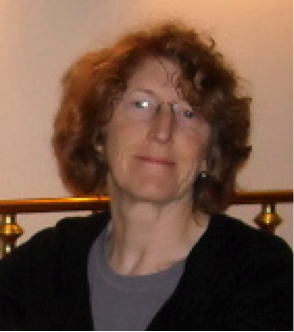 |
Alice Taff, PhD, is Research Asst. Prof. of Alaska Native Languages at the University of Alaska Southeast in Juneau, Alaska, USA. She has worked with Unangam Tunuu (Aleut, ale), Deg Xinag (ing), Haida (hdn), and Tlingit (tli) language communities to design, fund, and implement language documentation and revitalization efforts. She is President of the Society for the Study of the Indigenous Languages of the Americas and co-director of the Healing Through Language initiative of the Endangered Language Fund. |
 |
Fibbie Tatti |
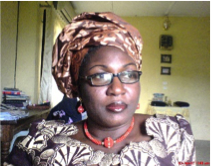 |
Imelda Icheji Lawrence Udoh received her Bachelor’s, Master’s and Ph.D degrees from the University of Calabar in 1983, 1986, and 1998. She is currently a Professor of Linguistics and a member of staff of the Department of Linguistics and Nigerian Languages, University of Uyo since 1986, where she has served as the Head of Department at different times. She has done extensive documentation and description of the languages of the Upper and Lower Cross Groups spoken in Akwa Ibom and Cross River States of Nigeria, such as Leggbo, Iko, Nkari, Anaang, Ibibio, Uda, etc. She has been a part of the E-MELD Workshops (Advisor since 2005); and attended CoLang 2012 (Lawrence), 2014 (Arlington). She has been involved in a language documentation project: The Abidjan-Bielefeld-Uyo Introduction to Language Document (ABUILD), which gave birth to the MA in Language Documentation and Description of the University of Uyo; in which she has taught the course: LDD 621 – Language Documentation and Description. |
|
|
Eno-Abasi Urua is a professor of Linguistics at the University of Uyo, Nigeria. She has been involved in extensive language documentation projects, with particular focus on Lower Cross languages of the Benue Congo group. She participated at InField 2010 at the University of Oregon; she co-taught Introduction to Phonetics with Professor Doug Whalen and was also the Practicum Instructor on the Uda language at CoLang 2012 at the University of Kansas. |
|
|
Doug Whalen is a professor in the Program in Speech-Language-Hearing Sciences, as well as Linguistics, at the Graduate Center of the City University of New York. He is also Vice President of Research at Haskins Laboratories in New Haven, CT, and an adjunct professor of Linguistics at Yale University. In 1996, he founded the Endangered Language Fund (ELF) and was President until January of 2015. His research focuses on acoustic and articulatory phonetics, primarily of English but also of several other languages, including (with support from National Science Foundation grants) Tahltan (ISO 639-3 code tht), Yoloxóchitl Mixtec (xty) and Arapaho (arp). His article, with Joyce McDonough, "Taking the Laboratory into the Field" (Annual Review of Linguistics, 2015) may be of special interest to CoLang attendees. The Healing Through Language initiative of ELF, now chaired by Alice Taff and Margaret Moss, was another of his projects. His current work includes measurements of the tongue during speech via ultrasound, the requirements for considering a language to be phonetically documented, and new ways of accounting for how speakers make use of variability in speech. |
 |
Nick Williams is a PhD candidate in linguistics at the University of Colorado Boulder. He has spent the past several years documenting everyday interaction among speakers of Kula, a non-Austronesian language of Alor in southeastern Indonesia. His dissertation research focuses on place reference in everyday conversation, including use of gesture and other non-verbal communicative practices. |


